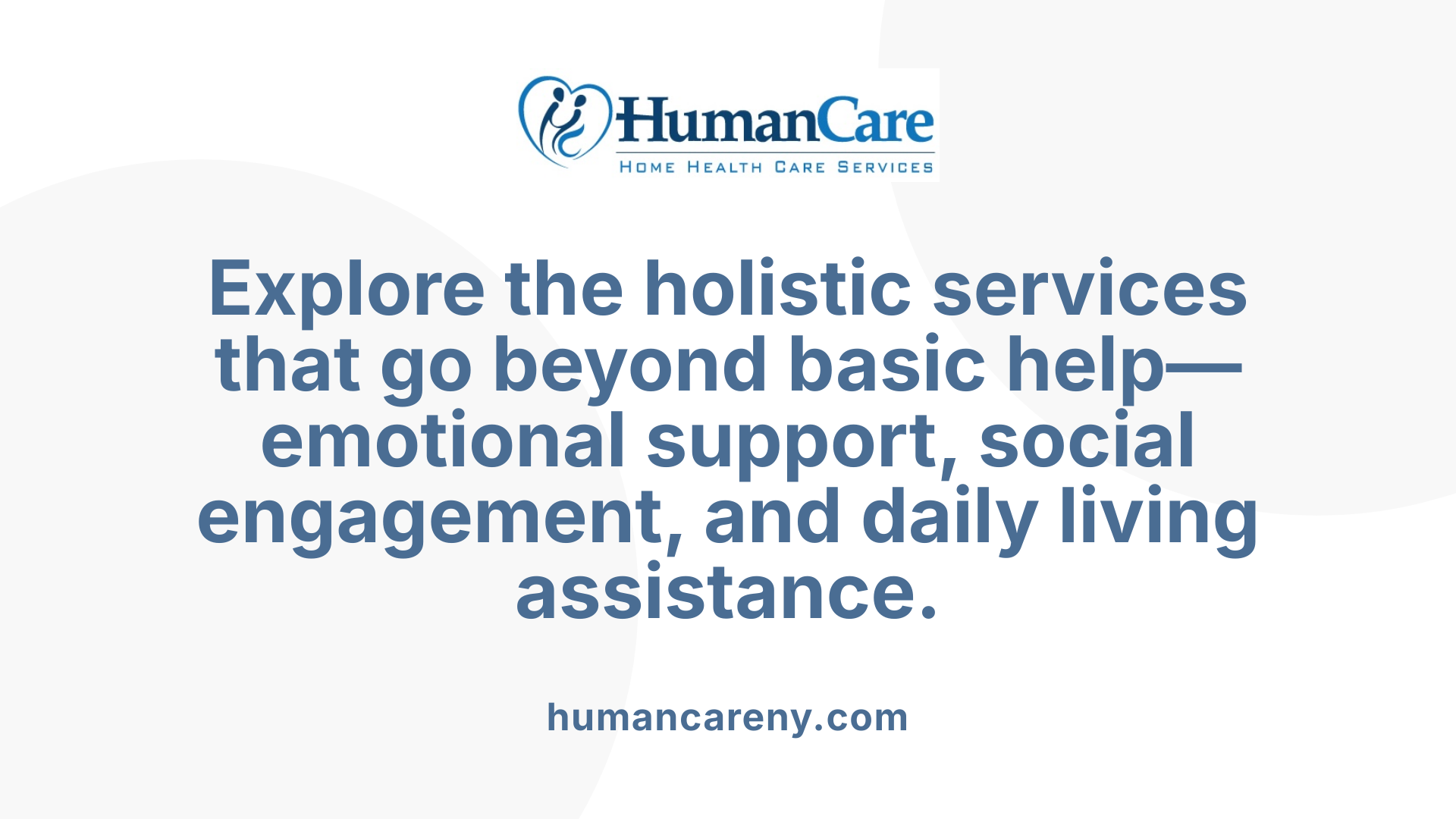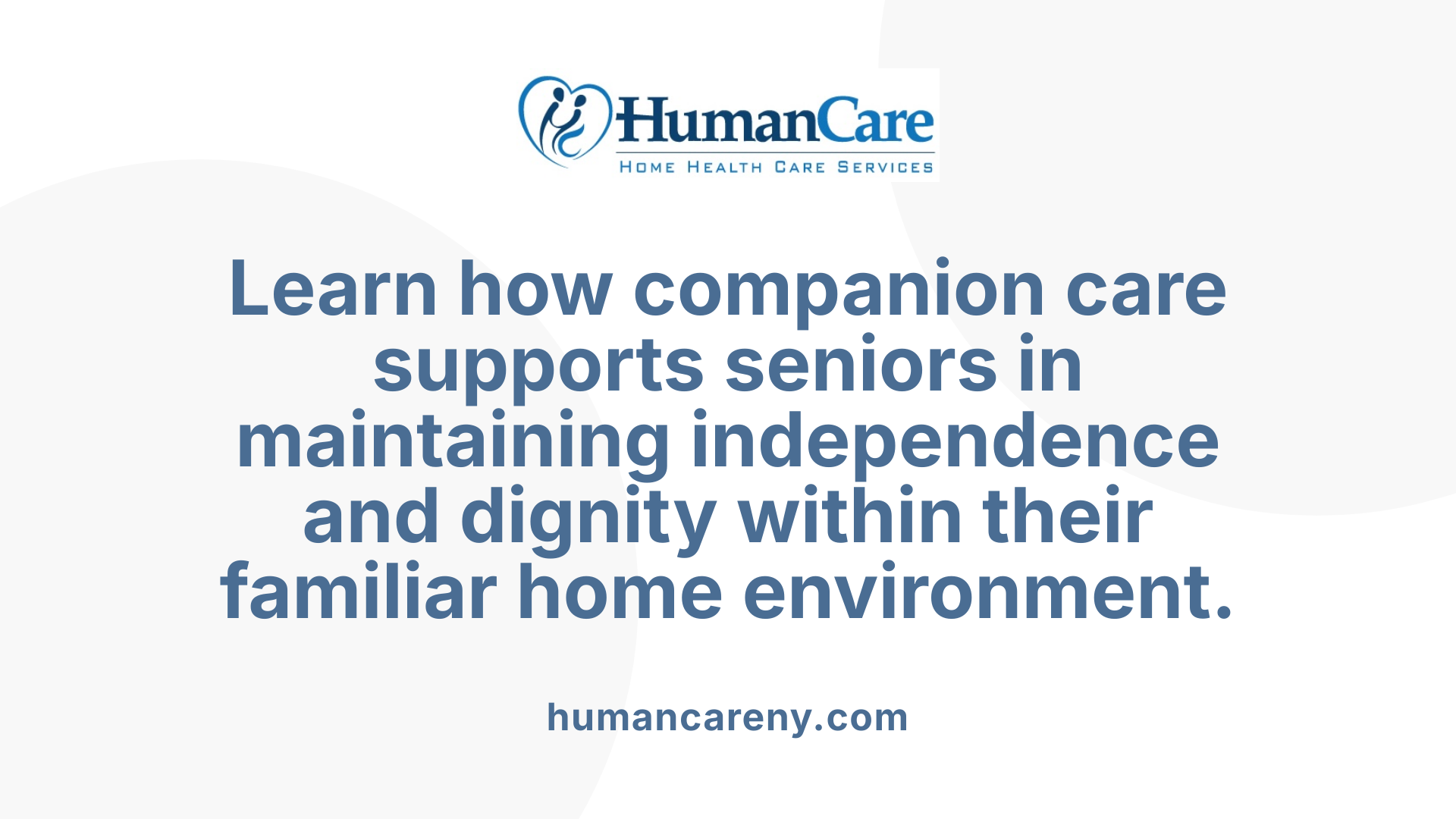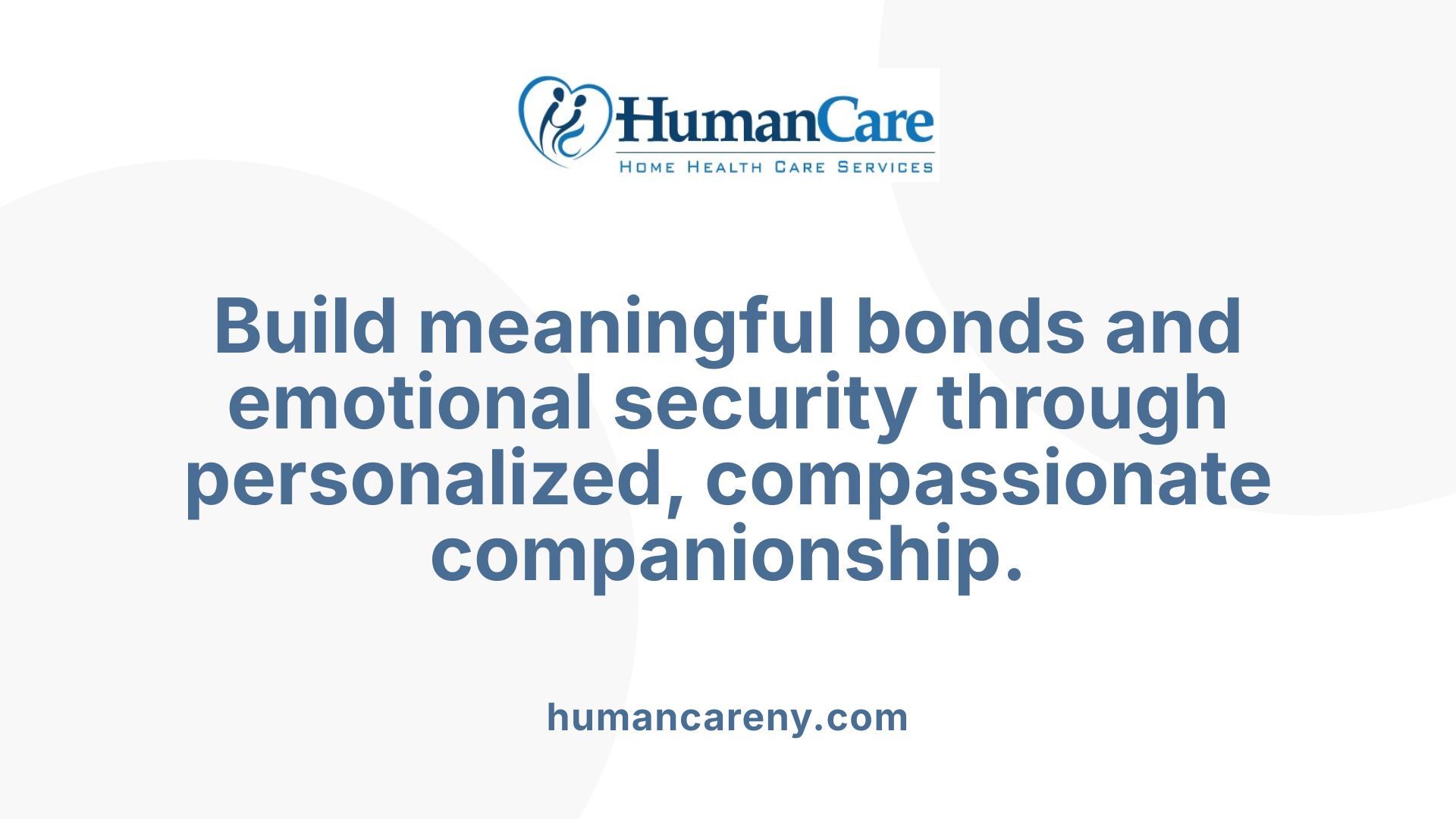Understanding the Vital Role of Companion Caregivers
Companion caregivers play an essential role in supporting seniors by offering more than just practical assistance. They provide emotional support, encourage social interaction, and help with everyday tasks, all of which contribute to seniors' overall well-being and independence. This article explores how companion caregivers support daily routines for seniors, addressing physical, emotional, and social needs within personalized care frameworks.
The Scope of Companion Care Services: Beyond Basic Assistance

What emotional support do companion caregivers offer?
Companion caregivers provide invaluable emotional support that enhances seniors' mood and overall outlook. This support helps seniors feel valued and understood, contributing to improved mental and emotional health.
What social interaction benefits do seniors gain from companion care?
Regular social interactions with companion caregivers significantly reduce feelings of loneliness and social isolation among seniors. These interactions contribute to improved mental health and overall quality of life by fostering companionship and trust.
How do companion caregivers assist with daily activities?
Companion care includes non-medical assistance with essential daily tasks such as running errands, meal preparation, and light housekeeping. These services enable seniors to maintain their independence and stay comfortably in their own homes while managing day-to-day responsibilities.
What is the non-medical focus of companion care?
Companion care centers around providing social interaction, emotional encouragement, and help with daily living activities without involving medical care. This holistic approach addresses the physical, social, and emotional needs of seniors, supporting their dignity and well-being through personalized care plans.
Combating Loneliness: Emotional and Social Support to Improve Mental Health

How does companion care reduce social isolation and loneliness among seniors?
Companion care services play a vital role in reducing social isolation and loneliness, which are common challenges faced by seniors. By providing regular social interaction and emotional support, these services create meaningful connections that help seniors feel valued and less alone. Activities like conversations, outings, or shared hobbies foster engagement and break the cycle of isolation.
Why is regular social interaction important for seniors?
Regular social interaction through companion care is essential for maintaining seniors’ mental and emotional health. Consistent companionship encourages communication and mental stimulation, which together improve mood and outlook. This ongoing connection helps prevent feelings of loneliness that can lead to depression or anxiety.
What kind of emotional support do companion caregivers offer?
Companion caregivers not only assist with daily tasks but also offer emotional encouragement and a comforting presence. This support helps seniors cope with stress and provides reassurance, often including techniques such as relaxation exercises. The trust and companionship built over time enhance seniors’ confidence and positivity.
What impact does companion care have on seniors’ mental and emotional health?
By addressing loneliness and promoting social engagement, companion care significantly improves seniors’ mental well-being. The emotional support and mental stimulation provided lead to better mood regulation, reduced anxiety, and a stronger sense of dignity and self-worth. Ultimately, this holistic approach enhances the overall quality of life for many seniors.
Supporting Physical Well-being and Safety in Daily Routines
How Do Companion Caregivers Assist with Safety and Health Monitoring?
Companion caregivers play an important role in maintaining seniors' physical safety. They help monitor daily health by observing any changes in condition and encouraging adherence to medication schedules. Their presence ensures prompt response to any emergencies, significantly reducing risks associated with living alone.
How Are Healthy Lifestyles Encouraged?
Caregivers promote nutritious eating habits by preparing meals that meet seniors' dietary needs. They also motivate physical activity tailored to individual capabilities, which supports mobility and overall health. This encouragement of balanced nutrition and regular exercise helps seniors maintain vitality and independence.
What Assistance Is Provided with Meal Preparation and Medication Reminders?
Meal preparation is a vital part of companion care that ensures seniors receive balanced and timely nourishment. Alongside this, caregivers provide medication reminders, helping seniors adhere to prescribed treatments, which is crucial for managing chronic conditions and preventing complications.
How Do Companion Caregivers Create a Safe Home Environment?
These professionals assist with light housekeeping and errands, which contribute to hazard-free living spaces by reducing clutter and maintaining cleanliness. This proactive approach to safety helps prevent falls and accidents, enabling seniors to live comfortably and securely in their homes.
Cognitive Engagement Through Personalized Activities and Conversation
How Does Companion Care Support Cognitive Health?
Companion care plays a vital role in maintaining and enhancing seniors' cognitive health. By engaging them in mentally stimulating activities and regular conversation, caregivers help to keep the mind active and reduce cognitive decline risks.
What Mentally Stimulating Activities Are Offered?
Caregivers tailor activities such as puzzles, reading, memory games, and creative tasks to the senior's interests and cognitive capabilities. These activities encourage problem-solving, concentration, and memory retention.
How Does Conversation Help Maintain Cognitive Function?
Regular meaningful conversation provides social interaction and challenges the brain to process new ideas and express thoughts. This mental engagement is crucial in keeping language skills sharp and supporting emotional well-being.
How Are Care Plans Customized for Cognitive Needs?
Personalized care plans are developed based on each senior's cognitive status and preferences. They adapt over time to reflect changing abilities, ensuring that the level and type of cognitive engagement remain appropriate and effective.
Preserving Independence and Dignity at Home

How Does Companion Care Support Seniors in Remaining at Home?
Companion care services are designed to help seniors maintain their independence by providing essential support within the comfort of their own homes. These services include assistance with daily activities such as errands, meal preparation, light housekeeping, and transportation. By helping with these tasks, seniors can avoid the need to move into assisted living or nursing facilities.
What Activities of Daily Living Does Companion Care Help With?
The range of activities covered by companion care includes:
- Grocery shopping and errands
- Meal planning and preparation
- Light housekeeping duties
- Medication reminders
- Social interaction and emotional support
This assistance not only helps seniors complete their daily routines but also reduces stress, allowing them to enjoy a higher quality of life.
Why Is Preserving Comfort and Dignity Important?
Remaining in a familiar home environment plays a crucial role in a senior's emotional well-being. Companion caregivers provide personalized care plans tailored to individual needs and preferences, supporting seniors’ independence while respecting their sense of dignity and self-worth. This respectful approach fosters trust and companionship, enhancing the overall quality of life.
How Does Companion Care Serve as an Alternative to Assisted Living?
Companion care offers a flexible and cost-effective alternative to residential care facilities. It enables seniors to live independently with appropriate support, reducing the need for relocation to assisted living or nursing homes. This option often provides peace of mind to families, knowing their loved one receives holistic care that addresses physical, social, and emotional needs within a community-based setting.
The Trusting Relationship Between Caregiver and Senior: Building Companionship

Building Trust and Companionship
Companion care thrives on the strong, trusting relationships formed between caregivers and seniors. Personalized care plans ensure that each caregiver’s approach is tailored to fit the unique needs and preferences of the individual, fostering a connection built on mutual respect and understanding. Many agencies, like ComForCare, focus on matching caregivers with seniors based on personality and background, which helps cement this important bond from the start.
Emotional Bonds and Quality of Life Enhancement
Developing emotional bonds is central to the companion care experience. Seniors receive not only assistance with daily tasks but also meaningful social interaction and emotional support. This companionship greatly enhances seniors' overall quality of life, helping them feel valued and understood. Regular conversations, shared activities, and encouragement nurture these bonds, promoting mental stimulation and emotional well-being.
Emotional Security and Stress Reduction
The presence of a trusted companion caregiver provides seniors with a crucial sense of security and comfort. Knowing someone is consistently there to listen, support, and assist reduces feelings of loneliness and anxiety. Caregivers often employ calming techniques, including relaxation exercises, which further help to alleviate stress and create an emotionally stable environment for seniors.
Flexible Scheduling and Holistic Support
Companion care offers flexible scheduling to accommodate seniors’ routines and preferences, making it easier to maintain regular social connection and support. The holistic approach addresses physical, social, and emotional needs by combining practical assistance with warm companionship. This well-rounded care promotes independence while ensuring seniors feel safe and cared for every day.
Family Peace of Mind and Customized Care Approaches

How Do Families Benefit from Caregiver Support?
Family members gain significant peace of mind knowing that a trained companion caregiver is regularly checking on their loved ones. This support ensures that seniors receive emotional support, assistance with daily tasks, and regular social interaction, reducing worries about loneliness and safety. The presence of a reliable companion also helps alleviate the stress often experienced by families managing elder care from a distance.
How Are Personalized Care Plans Developed and Adjusted?
Companion care services emphasize creating personalized care plans tailored to each senior's unique needs. These plans can include assistance with errands, meal preparation, medication reminders, and social activities. As seniors’ needs evolve over time, companion care plans are flexible and can be adjusted to continue providing the appropriate level of support, ensuring comfort and independence.
What Role Do Caregiver Matching Services Play?
Agencies like ComForCare specialize in caregiver matching to ensure a suitable pairing between the caregiver and senior client. Matching considers personality, background, and specific care requirements to foster trust and companionship. This individualized approach improves the quality of care and enhances the senior’s overall well-being.
What Are the Cost Considerations and Customization Options?
The cost of companion care varies depending on location and the number of service hours required. Generally, it is less expensive than in-home health care and is not typically covered by Medicare. Service customization allows families to select the level and types of assistance needed, balancing care quality with budget considerations.
Reflecting on the Impact of Companion Caregiving
Companion caregivers are invaluable partners in supporting seniors’ daily routines with kindness, respect, and personalized attention. Through a holistic approach that addresses emotional, social, physical, and cognitive needs, companion care not only preserves independence and dignity but also fosters mental and emotional well-being. Families gain peace of mind knowing their loved ones receive trusted, consistent companionship and support, making companion caregiving a vital service in enhancing seniors’ quality of life.



